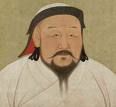
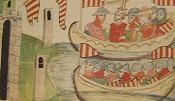

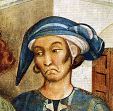


1280 The Wolf Minimum of minimum solar activity begins (ends 1350). On May 9 Magnus IV the Law-Mender (b. 1238) dies, and his teenie son Eric II Magnusson (the Priest-Hater) (1268-99) becomes king of Norway (until July 15, 1299), which is in decline, causing him to seek treaties with Scotland. On June 23 the Battle (Disaster) of Moclin in Granada is a V for Sultan Muhammad II over Infante Sancho of Castile and Order of Santiago grandmaster Gonzalo Ruiz Giron, who lose 2.8K KIA. On Aug. 22 Pope (since 1277) Nicholas III (b. 1216) dies in Suriano during the night of a stroke right after ordering wandering Spanish-born Jewish mystic Abraham Abulafia (1240-92) (founder of the School of Prophetic Kabbala) burned alive for trying to convert him to Judaism, saving him and allowing him to flee to Rome then Sicily and continue his mystic writing, until the local Jewish congregation gets him kicked out, after which he settles in Comino (near Malta). King (since July 27, 1276) Peter III the Great of Aragon (1239-85), husband of Constance of the Hohenstaufens (daughter of Manfred) captures most of the Aragonese nobility in a castle where they are plotting against him; no fool, Peter bases his army around a prof. core of Spanish, English, French, Italian and Hungarian mercenaries. The Asen Dynasty in Bulgaria ends as the Serbs, Greeks, and Mongols split the country up. John I becomes the last Latin lord of Athens. Edward I of England establishes a commission to examine Welsh law as a prelude to invading Wales. The Muslims use some form of incendiary weapon at the Battle of Cordoba (Cordova); the Muslim revolt in Valencia (begun 1276) ends. Osman I (1259-1324), founder of the Ottoman Dynasty is elected chieftain by his tribesmen in NW Anatolia around Dorylaeum (Eskishehir), and begins the systematic takeover of Anatolia. About this year the Ismaelians (Assassins) of Syria (40K Assassins who founded 10 castles in the hills above Tortosa (Tartus) are destroyed by the Mamluks. The first Jewish Ghetto to segregate Jews is created in Muslim Morocco, spreading to Europe; the word comes from the Venetian word for iron foundry after Jews are forced to live near one in 1516. The petty state of Toungoo in Burma is founded by Shan tribes fleeing from the Mongols, followed by Pegu (Bago) (Hanthawaddy) in S Burma. In this decade Tartu in Estonia joins the Hanseatic League. In this decade Maoris begin settling "the land of the long white cloud" (as viewed from Australia) New Zealand, making the 10-14-ft.-tall wingless moa bird (Dinorthiformes) extinct by the mid-15th cent. Starting in this decade Italian painting is all about the dueling Sienese School of Painting (known for Byzantine influence) and the naturalistic Florentine School of Painting, located in towns 60 mi. apart (Siena is S of Florence), and continuing through the 14th cent.; the Sienese School, founded by Duccio de Buoninsegna (1255-1319) and his pupil Simone Martini (1284-1344) copies the Byzantine school, churning out flat linear religious sentimental pseudo-iconic, usually brightly-colored and precisely detailed paintings; the Florentine School, founded by Giotto di Bondone (1267-1337) is the home of the rebels, inaugurating the Renaissance style with spatial perspective, naturalistic representation, and dramatic action; by the 16th cent. the Sienese School is kaput, and the Florentine School knocks your fillings loose? Inventions: Hans Speyer invents the Belt-Driven Spinning Wheel (from China?), causing a revolt among Flemish textile workers - throw them shoes? Science: In this decade Salvino d'Amarto (-1317) of Italy invents Eyeglasses (Spectacles). Art: Cimabue (1240-1302), Maesta (Maestà) (1280-5). Poetry: Rutebeuf (1248-85), Ouvres; collection of lyrical and satirical poems. Births: Persian Ilkhanid khan #8 (1304-16) (Muslim) Oljeitu (Uljeitu) (Uljaytu) (Olcayto) ("blessed") (d. 1316) AKA Muhammad Khodabandeh (Pers. "Man of God"); son of Arghun, brother of Mahmud Ghazan (5th successor of Genghis Khan); great-grandson of Hulagu. Swedish king (1290-1318) Birger Magnusson (d. 1321); son of Magnus III (1240-90) and Hedewig of Holstein. Mali king #10 (1312-37) (Sunni Muslim) Musa Keita I (d. 1337); son of Abu Bakr III, who abdicated because he was convinced that he could find the edge of the Atlantic Ocean. English Scholastic Nominalist philosopher (Franciscan friar) ("Doctor Invincibilis") ("Venerabilis Inceptor") William of Ockham (Occam) (d. 1347) in Ockham, Surrey; of Ockham's Razor fame; trains at Oxford and teaches in Paris, becoming the rival of Duns Scotus. Italian Florentine painter Bernardo Daddi (d. 1348); apprentice of Giotto. Italian Sienese school painter Pietro Lorenzetti (Laurati) (da Siena) (d. 1348); brother of Ambrogio Lorenzetti (1300-48); adopts the naturalistic style of Giotto - and betrays the faith? Italian physician-inventor Guida da Vigevano (d. 1349) in Vigevano, Lombardy; educated at the U. of Bologna; physician of Joan I of Navarre. English "Polychronicon" chronicler and Benedictine monk Ranulf Higdon (Higden) (d. 1364) in W England. Deaths: German philosopher-scientist Albertus Magnus (b. 1193) on Nov. 15 in Cologne: "Natural science does not consist in ratifying what others have said, but in seeking the causes of phenomena"; "Albertus Magnus arrogantly boasted of his speculation before the deity and suddenly became stupid." (Soren Kierkegaard) Dutch countess Margaret II of Flanders (b. 1202) on Feb. 10 in Ghent. Tibetan monk Drogon Chogyal Phagpa (b. 1235) on Dec. 15 in Lhakhang Palace, Sakya, Tibet; rumors that he was poisoned by former (fired) ponchen Kunga Zangpo causes an army of Mongols and Amdo Tibetans to invade next year and execute him. Norwegian king (1263-80) Magnus VI (b. 1238) on May 9 in Bergen.

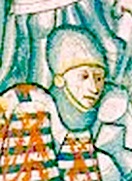
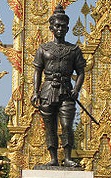
1281 On Feb. 9 future Scottish king (1292-6) John Balliol (1249-1314) marries Isabella de Warenne (1253-91), daughter of John de Warenne (John Plantagenet), 6th Earl of Surrey (1231-1304); they go on to have sons Edward Balliol (1284-1364) (future king of Scotland) and Henry Balliol (-1332). On Feb. 22 after Charles I of Anjou rigs the election, eel-loving cardinal (since 1261) Simon de Brie (Brion) (in Touraine between the Seine and Marne Valleys) is elected Pope (#188) Martin IV (1210-85), ending the anti-French era of papal policy (until 1282); he backs Charles of Anjou's ambitious dreams of Byzantine conquest and a Mediterranean revival of the Latin Empire run by the French (him), excommunicating Byzantine emperor Michael Palaeologus; Charles of Anjou invades Epirus, causing Michael to counter by financing a revolt in Sicily, forming the mercenary Catalan Co. of the East. In Sept. in Bergen Cathedral 13-y.-o. Eric II Magnusson of Norway marries 20-y.-o. Margaret Dunkeld (1261-83), daughter of Alexander III of Scotland, who promises to pay a dowry of 14K marks, smoothing relations between the two kingdoms for awhile and also smoothing relations between Norway and England. On Dec. 24 Henry the Blond (b. 1216) dies, and on Dec. 24 his son Henry VI (1240-88) becomes count of Luxembourg (until June 5, 1288). The Mongols invade Syria again (first time 1260). After returning to Japan and finding no suitable landing beaches because of defensive walls, a kamikaze (Jap. "divine wind") (typhoon) destroys Kublai Khan's fleet of 4.5K vessels and 150K men from Korea and the lower Yangtze Delta (largest naval invasion until D-Day in 1944) at Hakozaki Bay in Fukuoka, thwarting his invasion of Japan as in 1274, and causing the Japanese to later use the word kamikaze for their suicide bombers. Thai king Mangrai (Mengrai) (1238-1311) conquers the kingdom of Haripunjaya at Lamphun, going on in 1292 to found the Buddhist kingdom of Lan Na (Lannathai), centered at Chiengmai (Chiang Mai) in N Thailand, which fights off Mongols from the N for the next two decades. 20 years after setting out from Yuan China on a pilgrimage to Jerusalem, only to get holed-up in Baghdad instead, where they are welcomed by Nestorian patriarch Denha I, Turkish Chinese monk Rabban Bar Sauma (Sawma) (1220-94) and his student Rabban Markos return to Maragheh after Markos is elected Yaballaha III, patriarch of the Nestorian Church, and in 1278 he sends his former teacher to Rome to negotiate an entente between the Nestorian and Roman Catholic churches and form a strategic Franco-Mongol alliance against the Muslim Mamluk sultanate in Cairo, arriving after the death of Pope Honorius IV and negotiating with the cardinals instead, proceeding to Genoa then Paris, where he spends 1 mo. with Philip IV the Fair, then to Gascony, where he meets Edward I of England in Bordeaux, who is enthusiastic but begs off due to conflicts with the Scots and Welsh; he then returns to Rome, where new Pope Nicholas IV gives him communion on Palm Sun., 1288 before returning to Baghdad; Bar Sauma writes an account of his travels giving the viewpoint of the East on the West, beating Marco Polo. Births: Italian Ghibelline condottiero Castruccio Castracani degli Antelminelli (d. 1328) in Lucca. Ottoman sultan #2 (1326-59) Orhan (Orkhan) I (d. 1359) in Sogut; son of Osman I (1258-1326) and Malhun Hatun; father of Suleyman Pasha (1316-57) and Murad I (1326-89). Deaths: French Averroist philosopher Siger de Brabant (b. 1235) in Orvieto; murdered by a half-mad assassin after being condemned by the Inquisition in Oct. 1277 and spending his last years as a prisoner of the Roman Curia.
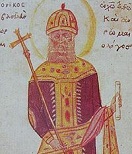

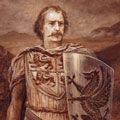
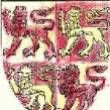
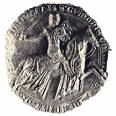
1282 On Mar. 30 (Easter Mon.) at the hour of Vespers near a church outside Palermo the War of the Sicilian Vespers (ends 1302) breaks out when 2K men, women and children, incl. nearly all the French in Sicily are massacred, causing the Sicilians to expel all the French and offer their throne to Peter III of Aragon, who is connected by marriage to the house of Hohenstaufen, and Aragon assumes rule of the kingdom of the Two Sicilies (until 1285); Philip III the Bold of France then leads a crusade against him as champion of Pope Martin IV, and a cent.-long war begins over Sicily between the Angevin kings of Naples and the Aragonese kings of Sicily (until 1442), with Sicilian independence secured at the cost of ruining the economy; meanwhile the old anti-French papal policy is resumed. In Apr. (Palm Sun.) after lesser Welsh princes get fed up with Edward I's royal officers and start a revolt, Prince Llywelyn the Last (b. 1223), the last prince of Wales leads his disgruntled Welsh against English strongholds; too bad, on June 19 his wife Eleanor dies in Garth Celyn during childbirth of daughter (only child) Gwenllian ferch Llywelyn (d. 1337), and Longshanks invades Wales, captures the breadbasket region of Anglesey, and offers Llywelyn a large estate in England if he will sell his people out, to which he replies that his ancestors had protected his people "since the days of Kamber son of Brutus" and so stuff it; he then leads a force S to mid-Wales, and on Dec. 11 is KIA at the Battle of Builth Wells in Powys after being tricked into separating from his main army, and his head severed, sent to London, and put up on a pike crowned with ivy, fulfilling the Welsh prophesy that Big Lion would ride crowned through the streets of London; on Dec. 11 his brother Dafydd ap Gruffydd (1238-83) succeeds him as prince of Wales (until Oct. 3, 1283), watching Welsh morale crumble as Longshanks goes in for the kyll. On Nov. 14 18-y.-o. Scottish Prince (heir apparent) Alexander (1264-84) (maternal nephew of Edward I of England) marries Margaret of Flanders (-1331), daughter of Count Guy de Dampierre of Flanders (1226-1304) in Roxburgh, recognizing Scotland's commercial future in Europe, with Berwick-upon-Tweed at the mouth of the Tweed River on the Scottish border emerging as a big North Sea port; too bad, the prince dies a little over a year later on Jan. 28, 1284, and Scotland begins a big tumble into the shanks, er, hands of Edward I Longshanks. On Dec. 11 emperor (since 1259) Michael VIII Palaeologus (b. 1223) dies, and his eldest surviving son Andronicus II Palaeologus (Andronikos II Palaiologos) (1259-1332) becomes Byzantine emperor (until 1328), immediately renouncing the church union established at the Second Council of Lyons in 1274. Rudolf I invests his sons Albert and Rudolf with Austria, Styria, and Carniola. Stefan Dragutin breaks his leg while hunting, and resigns unexpectedly in favor of his brother Stefan Uros II Milutin Nemanjic (1253-1321), who becomes king of Serbia (until 1321); Dragutin later decides to keep some parts in the N, founding the kingdom of Srem (Syrmia) (ends 1316), from the Danube to the Sava Rivers, with capital at Debrc (between Belgrade and Sabac), later becoming the first Serbian ruler to rule from Belgrade. The Danish nobility force King Eric V to sign a Danish Magna Carta, which establishes a Danish parliament and makes the king subordinate to it. A Mongolian army sent in ships from S China seizes the capital of the Hindu kingdom of Champa (Tsiompa) in coastal Vietnam (until 1283). Abaqa, viceroy (since 1265) of the Ilkhanid Dynasty in the Middle East dies, and Ahmed Tekuder (-1284), who was baptized a Nestorian Christian under the name Nicholas and converted to Islam becomes Ilkhanid sultan #1 (until 1284), zealously propagating Islam among his nobles, causing his Buddhist nephew Arghun to ask Kublai Khan to intervene. Canterbury archbishop John Pectin closes all London synagogues, and prohibits Jewish physicians from practicing on Christians. The Sung Academy in China closes. Florence takes the lead in European commerce and finance; Italy becomes the first country to use watermarks in making paper. German Hanseatic League traders in London dominated by Cologne form a corp. with their own Hanseatic Steelyard and guildhall; other German yards are later opened in York, Bristol, Yarmouth, Lynn, and Boston, the last two under the control of Lubeck and Hamburg; meanwhile the Wendish towns take over control of the Hanseatic League from Gothland. Science: The oldest Muslim reference to using a magnetic compass for navigation. Births: German duke of Upper Bavaria (1294-1301), German king (1314-47), king of the Romans (1314-47), king of Italy (1327-47), margrave of Brandenburg (-1323), HRE (1328-47), duke of Lower Bavaria (1340-7), countof Hainaut, Holland, Zeeland, and Friesland (1345-7), and count Palatine of the Rhine (-1329) Louis (Ludwig) IV (the Bavarian) (d. 1347) on Apr. 1; son of Duke Louis II the Severe of Bavaria (1229-94) and Matilda (Mechthild) (daughter of Rudolph I). French duke of Lorraine (1312-29) Frederick IV (the Fighter) (d. 1329) on Apr. 15 in Gondreville; son of Theobald II (1263-1312) and Isabella of Rumigny; husband of Elisabeth, daughter of Albert I of Germany; brother-in-law of Frederick III the Handsome. Spanish poet-writer Don Juan Manuel (d. 1348) on May 5 in Escalona; son of Manuel of Castile and Beatrice of Savoy; nephew of Alfonso X the Wise of Castile. French Pope (1352-62) Innocent VI (Etienne Aubert) (d. 1362) (b. 1295?) in Beyssac; created cardinal in 1342. Deaths: Welsh prince Llywelyn the Last (b. 1223) on Dec. 11. Byzantine emperor (1259-82) Michael VIII Palaeologus (b. 1223) on Dec. 11.

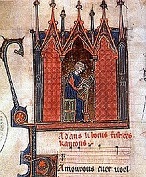

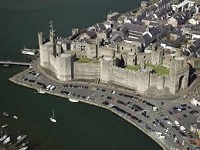

1283 On Apr. 9 Queen (since 1281) Margaret of Norway (b. 1261) dies after giving birth to daughter Margaret (d. 1290), later known as the Maid of Norway; meanwhile her whimpy 15-y.-o. daddy Eric II lets Bergen bishop (1278-1304) O.P. Narve and other magnates run his kingdom and control her education. In June Daffydd ap Gruffydd (b. 1238) is captured on Bera Mt. near Garth Celyn, and taken to Shrewsbury, England, where a special session of Parliament condemns him to be hanged, drawn and quartered on Oct. 3, making him the last free Welsh ruler; the House of Gwynnedd becomes extinct. 17-y.-o. Wenceslaus II (1271-1305) reaches the age of majority and becomes king of Bohemia, but is still being kept down by Zavis of Falkenstein. Ermengarde (Ermengard) (Irmgard) of Limburg (b. ?) dies sans heirs, launching the War of the Limburg Sucession (ends 1289) afer her hubby Reginald I of Guelders and her father Duke Waleran IV of Limburg's nephew Adolf VIII of Berg claim it, and the latter sells his claims to the powerful Duke John I of Brabant, starting out with a series of indecisive battles. he Teutonic Order of Knights compels the subjection of pesky Prussia, which becomes the last European nation to accept Christianity (with a sword); the Teutonic Knights are dissolved in 1525. The navy of Aragon raids the Kerkennah Islands in Tunisia; meanwhile the baronic Aragonese Uniones revolt and force Alfonso III to grant them a bill of rights known as the Privilegium Generale. A false Emperor Frederick II appears in Germany. The Mongols withdraw from Champa, but plan more attacks. A Jewish pogrom in Mainz, Germany kills 10 and results in the pillage of homes despite the efforts of Archbishop Werner to stop it. France joins the club and passes the death penalty for homosexuals - use the hot dog right or we'll roast it for you? The Turkoman principality of Germiyan is founded in W Anatolia, with capital at Kutahya (until 1389). 18-y.-o. Dante Alighieri joins the Dolce Stil Nuovo (Ital. "Sweet New Style") school of Italian love poetry, and becomes a leader of the Florentine Circle. Architecture: New (Old) St. Paul's Cathedral in London is begun (finished 1314), becoming the largest church in Europe; a ripoff of Notre Dame Cathedral in Paris? Caernarvon (Caernarfon) Castle on the Menai Straits in N Wales (near the ancient Roman fort of Segontium) is begun by Edward I (finished 1323), who invests his son Edward II as the first prince of Wales there; Edward III is invested there in 1911, and Prince Edward, er, Charles in 1969. Construction of cool Harlech Castle in Wales by the English begins (ends 1290). Inventions: King Ramkhamhaeng creates the Thai Alphabet. Plays: Adam de la Halle (1245-88), Le Jeu de Robin et Marion; first French secular play with music. Births: Scottish uncrowned queen ("Lady of Scotland") Margaret of Scots, Maid of Norway (d. 1290) in Apr. in Tonsberg (S of Oslo); daughter of Eric II of Norway and Margaret Dunkeld (1261-83), daughter of Alexander III of Scotland and Margaret, daughter of Henry III of England. Burmese Hanthawaddy king #3 (1311-23) Saw O (d. 1323). Spanish "The Book of Good Love" poet (archpriest of Hita) ("the Chaucer of Moorish Spain") Juan Ruiz (d. 1350) in Alcala de Henares (Alcala la Real), Andalusia. Deaths: Norwegian queen consort (1281-3) Margaret, Maid of Scotland (b. 1261) on Apr. 9 in Tonsberg, Vestfold;



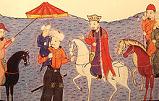
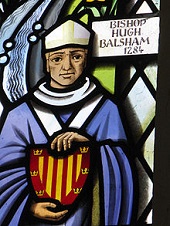
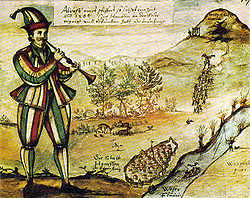
1284 Pope Innocent III predicted in 1213 that the Second Coming of Christ will happen this year because it is 666 years after the formal foundation of Islam (618), and Muhammad was obviously the Antichrist. In Jan. Prince Alexander (b. 1264), last male heir of widower (since 1275) Alexander III of Scotland dies, leaving only his 9-mo.-old granddaughter Margaret of Norway (b. 1283) as a legitimate heir, which causes him to send a delegation to France to seek a wife next Feb., beginning a long chain of troubles for Scotland as Edward I of England, the Hammer of the Scots decides that this is his cue to finish the pesky Scots off, after he disposes of the Welsh? A little ethnic cleansing a day keeps the Celts away? On Mar. 3 the Statute of Wales (Rhuddlan) sets up a new English govt. regime in Wales "as a member of the same body", with English common law replacing the 10th cent. Laws of Hywel; English settlers are invited in but no attempt is made to assimilate the Welsh; the marcher lords remain separate, and the English border barons go on to stink themselves up with tyranny, leading to the Owen Glendower Revolt of 1400. On Apr. 4 king (since 1252) Alfonso X the Wise (b. 1221) dies in Seville, and his son Sancho IV (the Brave) (1258-95) becomes king of Castile and Leon (until Apr. 25, 1295), ignoring the wishes of his daddy, who wanted the heirs of his dead elder brother Ferdinand de la Cerda (Hair Sprouting from His Chest) (1253-75) to rule, and a power struggle ensues, with Sancho IV bravely winning after executing 4K. On Apr. 25 Edward II (d. 1327), son of Edward I is born in Wales, and Alexander III hints to Edward I that he might later marry his granddaughter Margaret of Norway - I'm so hot for him and he's so cold? On Aug. 6 (Sun.) the 93-galley fleet of the Repub. of Genoa under adm. Oberto Doria (-1295) defeats the 72-galley fleet of rival city-state Pisa under adm. Alberto Morosini at the naval Second Battle of Meloria (1st in 1241) in the Tyrrhenian Sea off Bologna; Genoa enters a golden age, while Pisa begins to lean into permanent decline. On Aug. 16 after his bold daddy Philip III the Bold pushes him into it in an attempt to annex the yummy old Biscayan kingdom of Navarre to France, 16-y.-o. Philip IV the Fair ("the Pest of France" - Dante) marries 11-y.-o. princess Jeanne (Joan) I of Navarre (1273-1305), countess of Champagne (whose mother Blanche of Artois had sought Philip III's protection for her), obtaining Navarre, Champagne, and Brie for the French crown (until 1328) - sounds like a picnic? On Aug. 10 after obtaining limited help from the Mamluks, and being defeated by the larger army of pro-Christian devout Buddhist Arghun Khan (1258-91), Tekuder is executed on Aug. 10, and Arghun becomes Mongol Ilkhanid khan #4 of Persia (until Mar, 7, 1291), going on to send ambassadors next year to Pope Honorius IV offering a Franco-Mongol Alliance against the Muslims in the Holy Land, which is not answered even though it contains the soundbyte: "As the land of the Muslims, that is, Syria and Egypt, is placed between us and you, we will encircle and strangle ("estrengebimus") it. We will send our messengers to ask you to send an army to Egypt, so that us on one side, and you on the other, we can, with good warriors, take it over. Let us know through secure messengers when you would like this to happen. We will chase the Saracens, with the help of the Lord, the Pope, and the Great Khan"; more missions in 1287, 1287 and 1289 are also snubbed. On Aug. 29 (St. John's Day) the Pied Piper of Hamelin allegedly leads 130 children out of town to a cave on Koppen (Koppelberg) Hill/Mt. after he isn't pied, er, paid for luring the town's rats into the Weser River, extorting several times the original price in gold; the story is put on a stained glass window in the Church of Hamelin around 1300; pied means dressed in variegated-colored duds - I'll get rid of your rats for a thousand guilders to buy sequins for my pied piper duds? Pope Martin IV excommunicates and deposes Peter III of Aragon, and makes his teenie nephew Charles of Valois (1270-1325) (4th son of Philip III and Isabella of Aragon) king of Aragon and Sicily, starting the Aragonese Crusade, a struggle to end Aragon's control of Sicily (ends 1291). Charles I of Anjou convinces his nephew Philip III of France to march down to Italy to help him, but his forces get trapped at Genoa and he returns home. The Mongols invade Vietnam, capture Thang-Long (Hanoi) and win some early Vs, but the resourceful Vietnamese counterattack, trap the Mongols in the jungle heat, cut off their supply lines, and rout them. Gianciotto Malatesta of Rimini, married since 1275 to Francesca da Rimini (daughter of the prince of Ravenna) kills her and her brother for adultery. Jonkoping (Jönköping) becomes the first Swedish city to be granted a charter, from magnanimous Magnus I. The king of Ceylon sends a relic of the Buddha to Kublai Khan. Architecture: Egyptian Bahri Mamluk sultan #7 (1279-90) Al-Mansur Qalawun (1222-90) founds the Maristan al-Mansuri, the greatest hospital of the Middle Ages, which provides free medical and mental treatment, and provides dischargees with money so they don't have to return to work immediately. Peterhouse College is founded at Cambridge U. by Hugo (Hugh) de Balsham (-1286), bishop of Ely, and chartered by Edward I, becoming its oldest college. Ruthin School in Denbighshire, North Wales is founded by Reginald de Grey, becoming one of the oldest British public schools to survive to modern times; it goes co-ed in 1990. Inventions: Sequins are first coined in Venice. Births: English king (1307-27) (gay/bi?) Edward II (d. 1327) on Apr. 25 in Caernarfon Castle, Wales; son of Edward I (1239-1307) and Eleanor of Castile (1241-90); father of Edward III (1312-77). Dutch count of Holland (1296-9) John I (d. 1299); son of Count Floris V; father of John II of Avenes (1247-1304). English gay bud (of Edward II) Piers Gaveston, 1st Earl of Cornwall (d. 1312). Italian Sienese School painter Simone Martini (di Martino) (d. 1344); pupil of Duccio de Buoninsegna - named after the pope? Scottish king (1332-56) Edward de Baliol (d. 1364); son of John I Balliol (1249-1313). Deaths: Turkish humorist writer Nasrettin Hoca (b. 1208), leaving The Hungry Coat and other stories. Scottish prince Alexander (b. 1264) in Jan.



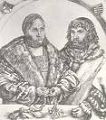


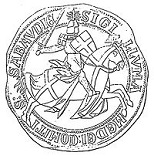
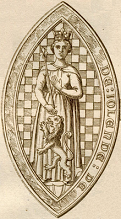
1285 By this year longtime pagan Prussia is completely subjugated and ruled by the Teutonic Knights as a papal fief. On Jan. 6 Charles I of Anjou (b. 1226) dies while his son Charles II (the Lame) of Anjou (1254-1309) is being held captive by the Sicilians; the latter concedes the Two Sicilies to Peter III to secure his release, but Peter III (b. 1239) dies on Nov. 11, and is succeeded in Aragon by his eldest son Alfonso III (the Liberal) (the Frank) (1265-91), and in the Two Sicilies by his 2nd son James II (1267-1327); a treaty is negotiated whereby James II renounces his claim to Sicily in favor of the pope, and Charles II gets the mainland portions, but the Sicilian parliament revolts and crowns Peter III's 3rd son Frederick III (1272-) in a long war; Peter's youngest son and namesake Peter IV of Aragon (1275-1296) is left out of the inheritance. On Jan. 24 Wenceslaus II of Bohemia marries Judith of Hapsburg, daughter of HRE Rudolf I. On Mar. 28 Pope (since 1280) Martin IV (b. 1210) dies after gorging himself on eels (later stigmatized by Dante), and on Apr. 2 Giacomo Savelli is elected Pope (#189) Honorius IV (-1287). In May the Cross of Neith (Y Groes Naid), a fragment of the True Cross once prized by the Gwynedd rulers of Wales is paraded through London in a procession led by the king, queen, archbishop of Canterbury, and 14 bishops, followed by the magnates of the realm - Wales has been absorbed by Edward Borg? On June 18 Yekuno Amlak dies, and Yagbe'u Seyon (Yagbea-Sion) (-1294) becomes Solomonic emperor of Ethiopia (until 1294), continuing his father's attempts to convince the Muslim Egyptians to appoint a metropolitan for the Ethiopian Orthodox Church, in vain. On Sept. 4 the naval Battle of Les Formigues (Las Hormigas) 50 mi. NE of Barcelona is a D for James II of Majorica, after which his nephew Alfonso III of Aragon annexes the Balearic Islands (until 1295). On Oct. 1 after his paternal uncle count (since 1268) Philip I of Savoy (b. 1207) dies without heir, and his elder brother Thomas III of Piedmont was killed in an accident in 1282, and Philip I's will appoints his niece Eleanor of Provence and her son Edward I of England as adjucators of his estate, who award Amadeus V (the Great) (1249-1323) the county of Savoy (until 1323), and his younger brother Louis I the barony of Vaud, Amadeus V is declared protector of Geneva by the bishop of Geneva, pissing-off Count Amadeus II of Geneva, who considered it his hereditary title, starting a war that ends in 1287 when Amadeus V captures Ile Castle in the Rhone River near Geneva after a 14-week siege; in 1295 Amadeus VI acquires the fortress of Chambery (Chambéry) in the Auvergne-Rhone-Alpes region of E France, making is his seat, and has it decorated by Giotto's student Georges de Aquila. The original I'm too sexy for my shirt takes over the French quatre-walk? On Oct. 5 French king (since Aug. 25, 1270) Philip III (b. 1245) dies in Perpignan after getting sick on his return home, claiming on his deathbed that his conquests were in the name of his family and not against the Church; his handsome recently-married teenie son Philip IV (Quatre) (the Fair) (the Handsome) (Le Bel) (1268-1314) (known for his long blonde hair) becomes Capetian king #11 of France (until 1314), ruling as a "constitutional king", letting himself be bound by law and precedent while trying to extend royal authority as far as possible, which means destroying the feudal system, while he cultivates an aloof image, causing people to call him a "useless owl"; "He is neither man nor beast, he is a statue" (Bishop Bernard Saisset of Pamiers). On Oct. 15 Alexander III of Scotland (b. 1241) marries his much younger 2nd wife Yolande de Dreux (1263-1330), sister of Count Jean of Dreux at Jedburgh, with a ghostly apparition allegedly appearing at the wedding as a bad omen - what else can go wrong? The Mongols attack Champa and Annam. The Statute of Merchants is passed in England. A blood libel in Munich, Germany results in the death of 68 Jews; 180 more are burned alive in a synagogue. London develops problems with smog - burning too many Jews? The town of Ryezhitsa (Rezekne) (Rositten) in Latvia (55 mi. NE of Daugavpils) is founded by the Teutonic Knights. After his life love Beatrice Portinari marries banker Simone dei Bardi in 1277, Dante Alighieri marries Gemma Donati; when Babe B dies in 1290, he's messed up for life? Inventions: The first mechanical clock is installed in St. Paul's Cathedral in London; it uses a verge-and-foliot (shaft with a weighted crossbar) escapement, which has an error of several hours per day and is temperature sensitive. The first spectacles for farsightedness are developed by Dominican friar Alessandro della Spina. Nonfiction: Abraham Abulafia (1240-92), The Light of the Intellect; "It is well known that the letters (of the Hebrew alphabet) have no vibration of their own, and therefore the Blessed God set into nature, in accordance with the Intellect, powers into the whole mouth in order to bring the letters into pronunciation, according to the form of their existence as found in books." Births: Chinese Yuan emperor (1311-20) Ren Zong (Ayurbarwada Buyantu Khan) (d. 1320) on Apr. 9. Spanish king of Castile (1295-1312) Ferdinand IV (the Summoned) (El Emplazado) (d. 1312) on Dec. 6 in Seville; son of Sancho IV the Brave (1257-95) and Maria de Molina (1265-1321). French countess (of Evreux) Marguerite d'Artois (d. 1311); eldest child of Philip of Artois and Blanche of Brittany; wife of Louis d'Evreux, son of Philip III and 2nd wife Maria of Brabant; mother of Marie (1303-35), Charles (1305-36), Philip III of Navarre (1306-43), Margaret (1307-50), and Joan (1310-70), wife of Charles IV. French Franciscan Order minister gen.(1329-49) Geraldus (Gerardus) Odonis (Guiral Ot) (d. 1349) in Camboulit, Lot. Deaths: Savoy count (1268-85) Philip I (b. 1207) on Aug. 16 in Roussillon, Isere; dies without heirs. Welsh theologian John of Wales (b. 1220). French king of Sicily (1266-85) Charles I of Anjou (b. 1226) on Jan. 6 in Foggia. Spanish king of Aragon and Valencia (1276-85) and king of Sicily (1282-5) Peter III of Aragon (b. 1239) on Nov. 2 in Vilafranca del Penedes; Dante's "Divine Comedy" portrays rivals Charles I of Anjou and Peter III "singing in accord" outside the gates of Purgatory. French king (1270-85) Philip III (b. 1245) on Oct. 5 in Perpignan. Ethiopian emperor (since 1270) Yekuno Amlak on June 19. French trouvere Rutebeuf (b. 1245).



1286 On Apr. 11 Pope Honorius IV excommunicates King James II of Sicily. On Mar. 19 shortly after telling his parliament to recognize the "illustrious girl Margaret... as our lady and right heir of our said lord king of Scotland", Alexander III (b. 1241) holds a long wine-soaked council with his nobles, decides to see his pregnant wife Yolande at Kinghorn Manor in Fife, takes a ferry across the Forth, then insists on riding his horse alone the last 8 mi. from Inverkeithing; too bad, his horse throws him on the beach, breaking his neck at Pettycur 1 mi. from his destination, and he is found the next morning on the shore; after his wife Yolande miscarries in the summer, and tries to cover it up by wearing pillows until she is found out, Scotland's worst nightmare comes true as Alexander III's 3-y.-o. granddaughter Margaret of Scots, the Maid of Norway (1283-90) is left as the only legitimate heir of the Canmore Dynasty; for the first time six guardians (two earls, two barons, two bishops) are chosen to govern the "community of the realm", acknowledging Margaret as future queen, which causes her to become the most eligible babe of the Wild West; the later near loss of independence causes Scottish nationalists Robert the Bruce et al. to pump Alexander III up as the ideal king of Scotland's Golden Age of Milk and Honey (don't say Camelot), and somebody to compose the poem Lament for Alisaunder, when he was actually just a so-so king, visiting nunneries in secret to dip his wick and leaving a large unpaid bill for Bordeaux claret, and was just lucky to preside over an expanding economy? - the original JFK? On Oct. 8 John I the Red (b. 1217) dies, and his son John II (1239-1305) (husband of Edward I of England's sister Beatrice) becomes duke of Brittany and 2nd earl of Richmond (until 1305). On Nov. 22 Eric V (b. 1249) dies, and his 12-y.-o. son Eric VI Menved Eriksson (1274-1319) becomes king of Denmark (until 1319), doing a bang-up job before the German Hanseatic League gets strong enough to take over. Edward I of England does homage to Philip IV of France for Guienne. A Jewish pogrom in Oberwesel, Germany starts after some Jews are accused of draining the blood of a Christian, resulting in 40 killed; this causes the Jews to give up and begin emigrating from the Rhineland in Germany (incl. Mainz, Worms, and Speyer) to Palestine to live under the Muslims, while a minority head for Poland and Lithuania, which welcomes them. The unpopular Gabelle (Arab. "qabala" = he received) commodity tax is first levied in France by Philip IV, going on to become restricted to salt in the mid-14th cent., with a mininum weekly purchase required by every person over eight years old, after which six "pays" (provinces) each develop their own price (highest for salt coming from the Atlantic, half that for salt coming from the Mediterranean), aggravating the situation and causing a black market to flourish. Nonfiction: Moses of Leon (1240-1305), Sefer (Seper) ha-Zohar (Book of Splendor); bestseller covering all the elements of the Qabbala; claims it was written by 2nd cent. rabbi Simon ben Yohai; too bad, he has him refer to an eclipse in Rome in 1264, and his wife admits that he is doing it for money. Raymond Lully (1235-1315), Libre de Maravelles. Births: Spanish king of Castile (1295-1312) and Leon (1301-12) Ferdinand IV "the Summoned" (d. 1312) on Dec. 6 in Seville; son of Sancho IV. English high commissioner and favorite of Edward II (bi?) Hugh le Despenser the Younger (d. 1326); son of Hugh le Despenser the Elder (1261-1326) - hugh both are indispensible? Scottish military leader Sir James "Black" Douglas (Gaelic "dubh glas" = dark water) (d. 1330) in Douglas, Lanarkshire; son of Sir William the Hardy of Douglas (-1298); educated in Paris; knighted in 1314. Italian Franciscan missionary Odoric (Odorico) Mattiuzzi (Mattiussi) of Pordenone (d. 1331) in Villanova (near Pordenone), Friuli. Dutch count of Holland and Zeeland (1304-37) ("the Father-in-Law of Europe") William I the Good, Count of Hainault (Hainaut) (William III of Avesnes) (d. 1337); son of John II of Avesnes (1247-1304); wife of Jeanne of Valois (sister of Philip VI of France); father of Count William II of Hainault (1307-45), Countess Margaret II of Hainault (1311-56) (wife of HRE Louis IV), Philippa of Hainault (1311-69) (wife of Edward III of England), Joanna of Hainault (1315-74) (wife of Duke William V of Julich), and Isabelle of Hainault (1323-61) (wife of Robert of Namur). French duke of Brittany (1312-41) John (Yann) (Jean) III (the Good) (d. 1341) on Mar. 8 in Chateau de Champtoceaux; son of Arthur II (1262-1312) and 1st wife Mary of Limoges. Deaths: French duke of Brittany (1237-86) John I the Red (b. 1217) on Oct. 8. Syrian bishop and brain man Gregory Bar Hebraeus (b. 1226) on July 30 in Maraga, Persia; leaves Cream of Science (Aristotelian philosophy), Book of the Pupils of the Eyes (logic and dialectics), Storehouse of Secrets (Bible commentary), and Chronicon Ecclesiasticum (history of the West Syriac church, the patriarchs of Antioch, the Eastern Church, the Nestorian patriarchs, and the Jacobite Maphrians). Scottish king (1249-86) Alexander III (b. 1241) on Mar. 19 in Fife. Endlish bishop Hugh (Hugo) de Balsham (b. ?) on June 26 in Dodington Manor, Isle of Ely.
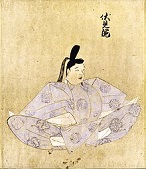
1287 On Feb. 2 Rudolf of Hapsburg is finally crowned HRE in Rome, and proclaims a Public Peace at the Diet of Wurzburg. On Feb. 27 Charles of Salerno signs a contract renouncing his claims in Sicily in favor of James II of Aragon; the pope repudiates it, and on June 24 (midsummer) (St. John's Day) the Battle of the Counts (Sorrento Bay) near Naples between Charles II of Naples and James II of Aragon sees a fleet of 40-45 Aragonese and Sicilian galleys commanded by Roger of Lauria defeat a fleet of 70 Angevin galleys commanded by Reyald III Quarrel of Avelia and Narjot de Toucy, with 12K Angevins KIA, 40 galleys captured, and 5K taken POW. In Feb. the South England Flood of 1287 destroys Winchelsea and Broomhill, and diverts the Rother River away from New Romney, ending its role as a port, allowing Rye to take its place; New Winchelsea is built on higher ground; on Dec. 14 after a huge storm and storm tide in the North Sea and English Channel, St. Lucia's Flood kills 50K-80K in the Netherlands and N Germany, becoming one of the largest floods in recorded history, with a freshwater lake connected to the North Sea by the Vlie River becoming the Zuiderzee (Southern Sea), reshaping the coastline and giving sea access to Amsterdam; on Dec. 14 the storm and tide kills thousands in England; the port of Dunwich in Suffolk, England is devastated; the monastery of Spalding, England is destroyed. On Apr. 3 Pope (since 1285) Honorius IV dies, and it takes almost a year to elect a replacement. On Apr. 4 as the Mongols invade Burma, the Theravada Buddhist Hanthawaddy Pegu Kingdom in Lower Burma (ends 1552) is founded by King Wareru (1253-1307), with capital at Martaban (Mottama). On June 8 Rhys ap Maredudd revolts in Wales (until 1288). On July 17 a mob in Oberwesel, Germany kills 40 Jews after a ritual murder accusation. On Nov. 27 emperor (since Mar. 6 1274) Go-Uda (b. 1267) abdicates, and his 1st cousin Fushimi (1265-1317), 2nd son of Go-Fukakusa becomes Japanese Yamato emperor #92 (until Aug. 30, 1298). The Mongols led by Khan Talabuga and Nogai Khan invade a-one-and-a-two-and-a-3-a (3rd time) Poland, ravaging Lublin, Mazovia, Sandomierz, and Sieradz; Leszek the Black flees to Hungary; the Mongols are defeated and fail to take Cracow (Krakow). The Polos accompany Kublai Khan on an expedition to destroy his uncle Nayan; Kublai has 260K cavalry and 100K infantry, while Nayan has 400K horsemen; the Mongols invade Champa and Vietnam (until 1288), and Burma (Pagan), where Narathihapate has just died, winning the Battle of Pagan in Dec., ending the Pagan Empire, which disintegrates into smaller kingdoms; Lanna King Mangrai and Sukhothai King Khamhaeng agree to a peace in Thailand. Egyptian Mamluk sultan Al-Mansur Qalawun captures the port city of Latakia in Syria; meanwhile Mongol ilkhan Arghun sends Beijing, China-born Nestorian monk-traveler-diplomat Rabban Bar Sauma (Sawma) (Cauma) ("son of fasting") (1220-94) (of Turkic Uyghur origin) from Baghdad to the leaders of Europe with a large retinue and 30 riding animals to negotiate an alliance against the Mamluk sultanate, witnessing the naval Battle of Sorrento Bay, then visiting Rome and receiving communion from new pope Nicholas IV on Palm Sun. 1288 before returning to Baghdad in 1288 without success, then writing his memoirs, which give an alternative view of Kublai Khan compared to Marco Polo, along with a Chinese view of Europe, causing him to become known as "the Reverse Marco Polo". Edward I of England orders the expulsion of the Jews from he duchy of Gascony, and confiscates their property. Siena, Italy exacts its first forced loan on taxpayers. Architecture: The Altar of St. James in Pistoia Cathedral in Italy is begun, taking almost 200 years, eventually containing a ton of silver. Uppsala Cathedral in SE Sweden is begun (finished in 1435). Science: Spanish missionary-alchemist Raymond Lully (1235-1315) discovers nitric acid. Births: English coulda-been king (1329-30) Marcher lord Roger Mortimer, 1st Earl of March (d. 1330) on Apr. 25 (Feast of St. Mark) in Wigmore Castle, Herefordshire; eldest son of Edmund Mortimer, 2nd baron Mortimer (1251-1304) and Margaret de Fiennes; consort of Queen Isabelle of England; grandfather of Roger Mortimer, 2nd earl of March (1328-60); same birthday as Edward II. Deaths: German poet Konrad von Wurzburg (b. 1225) on Aug. 31; leaves Trojanerkrieg (The Trojan War) (unfinished).



1288 On Feb. 22 Girolamo Masci is elected Pope (#190) Nicholas IV (1227-92) (first Franciscan) - nick four francisco popo? On June 5 the Archbishop of Cologne's army is defeated by Duke John I of Brabant at the Battle of Worringen, N of Cologne, giving Brabant possession of the duchy of Limburg, and ending the War of the Limburg Sucession (begun 1283); Count Adolf V von Berg grants Dusseldorf the right to call itself a city. Edward I of England mediates a treaty confirming James II of Aragon as king of Sicily, but Pope Nicholas IV annuls it. Leszek the Black (b. 1241) dies, and the throne of Cracow is up for grabs for years; Silesian duke of Wroclaw (since 1266) Henryk IV Probus (Lat. "righteous") (1258-90) (of the Silesian branch of the Piast Dynasty) seizes power first, becoming high duke of Poland (until June 23, 1290). Philip IV begins a battle with the bishop of Poitiers and the cathedral chapter of Chartres (ends 1290), winning an acknowledgement of the principles of royal temporal jurisdiction throughout his realm, and that clerical privileges are guaranteed by the king not the pope. After complaints over taxes, Philip IV of France tightens his control over Flanders. The Code of Croatian Customary Law is written in Novi Vinodolski. The Mongols invade Turkey and Asia Minor. The Vietnamese turn into guerrilla fighters, cut off the Mongol supply lines, and kick their butts out of the country. Lady Ganapati of Kakati in E India dies. The Slave Dynasty of Delhi (founded 1206) ends, and in 1290 is succeeded by the Muslim Khilji (Khalji) Dynasty (ends 1320), starting with Jalal-ud-din Khalji (Firuz) (1226-96) (until July 19, 1296), becoming the 2nd dynasty to rule the Delhi Sultanate of India, going on to make conquests in S India while fending off the Mongols and converting some of them to Islam. Under Philip IV the first mass-burning of Jews on the stake takes place in France. Ethiopian emperor (since 1285) Yagbe'u Seyon sends a bishop on pilgrimage to Jerusalem, and on his return he is captured by the sultan of Adal in Somalid (or Aden in Arabia), who tries to convert him to Islam and then circumcises him when he fails, pissing-off the emperor, who marches on Aden, kicks his butt, and captures his capital of Zeila; the story was related by Marco Polo. The first beer brewer in Frankfurt am Main, Germany is mentioned in city ordinances. Architecture: The pointed Gothic Muncipal Palace in Siena, Italy is begun (finished 1309). Inventions: Chinese soldiers use Heilongjiang bronze hand-held cannon to fight the Mongols in Manchuria; the Chinese have 3K cast bronze and iron cannon mounted on the Great Wall of China; the oldest cannon to survive to modern times dates to this year, and has a muzzle bore diam. of 1 in.; the 2nd oldest is from 1332 (4 in.). Nonfiction: Abraham Abulafia (1240-92), The Book of the Sign (Sefer ha-Ot). Fra Salimbene, Chronicle; Franciscan monk tells all that goes on behind the scenes, mostly boring. Births: Japanese Yamato emperor #93 (1298-1301) Go-Fushimi (Fushimi II) (Tanehito) (d. 1336) on Apr. 5; son of Fushimi (1265-1317) - Go Fish? Japanese Yamato emperor #96 (1318-39) Godaigo (Daigo II) (d. 1339). Russian grand duke of Moscow (1328-40) Ivan I Danilovich (Kalita) (Moneybags) (d. 1340); son of Danil Alexandrovich (1261-1303); father of Simeon Ivanovich Gyordi (1316-53). Hungarian king (1301-42) Charles I Robert (Carobert) (d. 1342) in Naples, Italy; grandson of Charles II of Naples (1254-1309) and Maria of Hungary (1257-1323). French philosopher-mathematician-astronomer-physician (Jewish) Levi ben Gerson (Gersonides) (Magister Leo Hebraeus) (d. 1344) (AKA RLBG) in Bagnois-sur-Ceze. Deaths: Arab Muslim physician Ibn al-Nafis (b. 1213) on Dec. 17. Polish king (1279-88) Leszek the Black (b. 1241). French poet Adam de la Halle (b. 1245).




1289 In Mar. after German-descent Italian Ghibelline "Cannibal Count" and naval cmdr. Ugolino della Gherardesca (1220-89) of Pisa is arrested for treason, he starves to death with his enemy Archbishop Ruggieri in the (leaning?) Muda Tower in Pisa after being entrapped in ice up to the neck in the same hold, causing Ugolini to gnaw on Ruggieri's skull; Dante relates the episode in his "Inferno", assigning them both to the ice of the 2nd ring (Antenora) of the lowest circle - the original Hannibal the Cannibal? On May 29 Pope Nicholas IV crowns Charles II of Anjou as king of Sicily and Naples (the Two Sicilies). On June 11 the Battle of Campaldino is a V for 12K pro-papal Guelphs over 11K pro-HRE Ghibbelines from Arezzo, securing Florence for the Guelphs; Dante Alighieri fights for the Guelphs. On July 18 the pope's constitution grants the cardinals one-half of the revenues of the Apostolic See plus a share in the financial admin. In Nov. after Edward I secured papal approval in May the Treaty of Salisbury (Birgham) betrothes Edward II of England to Margaret the Maid of Norway. King (since 1269) Leon III (b. 1236) dies of arsenic poisoning, and his Frankish Christian son Hetum (Hethum) II the One-Eyed (1266-1307) becomes king of Mongol-controlled Lesser Armenia (Cilicia) (until 1293, then 1295-6, and 1299-1303), writing a Chronicle of Armenia. Pope Nicholas IV sends Franciscan missionary Giovanni da Montecorvino (1247-1328) to China; after staying in Madras from 1291-2, he arrives in Khanbalik (Peking) in 1293. Pope Nicholas IV issues a bull combining several schools dating back 100+ years into the U. of Montpellier in Montpellier, France on the Lez River 31 mi. SW of Nimes, with the school of medicine starting out on the wrong foot by claiming that the Black Death is caused by a miasma entering open body pores, arguing against bathing; in 1529 it expels student Nostradamus for having worked as an apothecary; alumni later incl. Rabelais and Paul Joseph Barthez; in 1593 it founds the Jardin des Plantes de Montpellier, becoming the first botanical garden in France. Inventions: Letters containing block printing are sent from Persia to the king of France, going on to be developed in Ravenna. Births: Hungarian king (1301-5) and Bohemian king (1305-6) Wenceslaus (Wenceslas) III Premyslid (d. 1306) on Oct. 6 in Prague; son of Wenceslaus II (1271-1305) and Judith of Hapsburg (daughter of Rudolf I of Germany); brother of Elisabeth I of Bohemia (1292-1330), wife of John the Blind of Luxembourg (1296-1346); last Premyslid ruler of Bohemia. French Capetian king (1314-6) Louis X (le Hutin) (the Quarreler) (the Stubborn) (d. 1316) in Oct.; son of Philip IV (1268-1314) and Jeanne I of Navarre (1271-1305); founder of the French House of Navarre through 1st wife Margaret of Burgundy, their son Jeanne, Queen of Navarre, her hubby Philip of Evreux, and their son Charles of Navarre. Austrian/German Hapsburg duke (1308-30) Frederick I/III (the Handsome) (the Fair) (d. 1330); son of Albert I (1255-1308) and Elisabeth of Tirol (1262-1312) in Vienna; brother of Otto IV the Merry (1301-39) and Albert II (1298-1358). King of Hungary-Croatia (1308-) Charles I (Charles Robert) (d. 1342); eldest son of Charles II of Naples (1254-1309) and Maria Arpad of Hungary (1257-1323). Italian Renaissance painter Vitale (Vidolini) da Bologna (d. 1369) (b. 1309?).